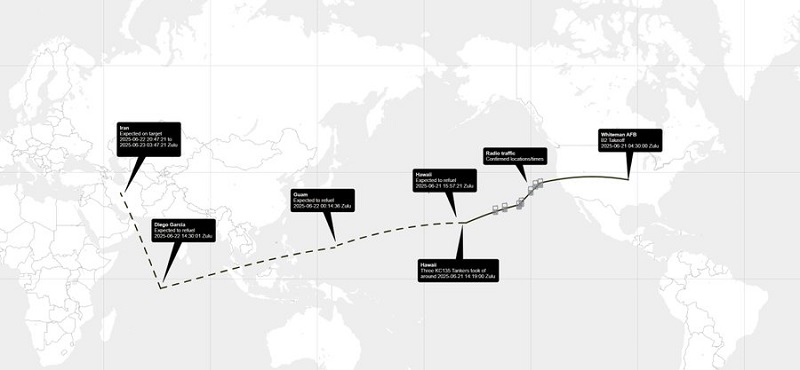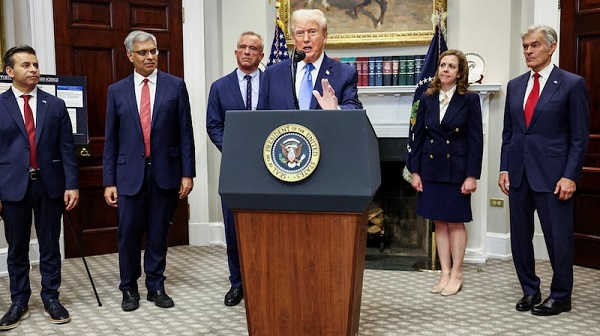International
Trump’s Strike on Iran Reshapes Global Power Balance, Deals First Blow to Beijing and CRINK Axis

Some analysts say the U.S. strike marks the West’s first major blow in an emerging global war against the ‘CRINK’ alliance — China, Russia, Iran, and North Korea.
At 8:00 p.m. on Saturday, President Donald Trump confirmed that U.S. B-2 stealth bombers had penetrated Iranian airspace overnight and delivered precision strikes on multiple nuclear enrichment facilities—marking the first direct American military action targeting Iran’s nuclear program since the conflict with Israel escalated.
Trump said the strikes were “massive” and necessary to prevent the world’s most dangerous regime from acquiring the world’s most dangerous weapons.
The United States and its military had completed a strike unprecedented in history and that no other military can achieve, Trump declared in a televised address from the Oval Office, arguing that Iran had sought the destruction of Israel and America, and killed many U.S. soldiers.
The president’s remarks confirmed what international observers and Israeli defense officials had begun to piece together in the early hours of Saturday in the Middle East: that American forces had joined Israel’s rapidly expanding campaign to dismantle the Islamic Republic’s nuclear and military infrastructure—a move with historic ramifications for the balance of power in the region and for global security.
This attack, while narrowly focused on nuclear targets, may mark a broader inflection point in the strategic landscape of what some U.S. defense analysts call the “CRINK” war—referring to the de facto alliance of China, Russia, Iran, and North Korea.
This morning Mike Gallagher, the former chairman of the House Select Committee on the Chinese Communist Party and now a national security adviser, said the strike marked a return to credible power projection.
“Deterrence comes from dominant force and the willingness to use it,” he posted to X. “Last night, President Trump took a critical step toward restoring deterrence in the Middle East and around the world.”
According to senior U.S. defense officials, the strikes involved a small number of stealth bombers supported by aerial refueling tankers and surveillance aircraft operating from bases in the Middle East and Europe. The targets included Iran’s deeply buried Natanz uranium enrichment complex and secondary facilities near Arak and Fordow.
Of these, Fordow is considered Iran’s most fortified nuclear site—tunneled into a mountainside near the holy city of Qom and designed to survive conventional airstrikes. Reaching it requires specialized bunker-penetrating munitions. Only the United States possesses weapons capable of striking such hardened targets: most likely the GBU-57 Massive Ordnance Penetrator, a 30,000-pound bomb built to bore through hundreds of feet of reinforced rock and concrete. Defense sources say multiple sequential detonations would be required to break through the mountain’s layers and disable the underground enrichment halls.
Early satellite imagery and Iranian state media appeared to corroborate the targeting of Natanz, reporting heavy damage and widespread power disruptions across the site and adjacent military compounds. Iran’s Islamic Revolutionary Guard Corps issued a statement vowing retaliation but acknowledged that “enemy aircraft penetrated undetected and struck sensitive infrastructure.”
The United States, by committing its own strategic assets to destroy critical Iranian military infrastructure, has gained the initiative in what could be seen as the first true strategic victory for the West in World War III—a long, undeclared conflict characterized by economic warfare, proxy combat, gray-zone cyber operations, and regional insurgencies. The Pentagon and White House now face critical choices that could significantly shape the remainder of this century.
The strike could come at a high cost, but also could deliver epoch-shifting, decisive strategic benefits. Iran supplies drones to Russia, subsidizes oil to China, and provides weapons to terrorist actors that threaten U.S. bases and allies from the Gulf to the Mediterranean, military and intelligence analysts argue. Its defeat would damage the CRINK axis, remove a key enabler of great power revisionism, and restore American leverage after years of attritional conflict.
Trump’s language Saturday night suggested he may favor such a path.
In Jerusalem, Israeli Prime Minister Benjamin Netanyahu praised the American action as “a decisive blow against the terror regime in Tehran.” In a national address hours after the U.S. confirmation, Netanyahu said, “This is not just Israel’s fight—the free world has acted.”
Israeli media reported that the Israeli Air Force had provided electronic warfare support and real-time intelligence for the U.S. strikes, though officials declined to confirm operational details. In Tel Aviv, civilians remained under heightened alert, but there were signs of cautious optimism. “The alliance between Israel and the United States is at full strength,” one senior Israeli official told local media. “We have shifted the strategic calculus in the region.”
Iran’s Supreme National Security Council convened an emergency session overnight. Government officials condemned the strikes as an act of war and said Tehran would respond “at a time and place of our choosing.” As of Sunday morning EST, no immediate missile launches had been detected. However, Western intelligence agencies were monitoring known Iranian proxy forces in Lebanon, Iraq, Syria, and Yemen for signs of mobilization.
On Iranian social media channels, state-linked accounts circulated images of damaged facilities alongside calls for retaliatory “martyrdom operations” against U.S. and Israeli targets.
The joint U.S.-Israeli operation followed weeks of escalating hostilities, beginning with Israeli airstrikes deep inside Iranian territory that disabled radar arrays, weapons depots, and drone launch sites. Iranian retaliation—including missile and drone attacks on Israeli cities—prompted increasingly urgent warnings from Western capitals that the situation risked spiraling into open regional war.
In Tehran, BBC correspondents reported a rare mix of panic and defiance among civilians. Some feared a full-scale war was imminent. Others expressed anger at their government for failing to protect key military and nuclear assets.
European leaders called for restraint. In an interview late Saturday night EST, German Chancellor Friedrich Merz described the strike as “a painful but necessary step.” French officials warned of “a dangerous path toward uncontrollable conflict.”
In Washington, current and former intelligence officials said the operation signaled a fundamental shift in U.S. posture.
The Pentagon later confirmed the deployment of additional U.S. forces to the region, including carrier strike groups and long-range missile defense batteries.
Whether the operation succeeds in deterring Iran from restarting its nuclear weapons program—or sparks a wider war in the Middle East—remains uncertain. What is clear is that the seismic shift beneath Fordow began in Iran, but its aftershocks are now reverberating through the war rooms of Beijing and Moscow.
Editor’s Note: The first version of this story was updated to paraphrase President Trump’s remarks, and add a comment from former senator and CCP committee leader Mike Gallagher.
The Bureau is a reader-supported publication.
To receive new posts and support my work, consider becoming a free or paid subscriber.
Invite your friends and earn rewards
Business
Trump approves deal for majority-American control of controversial app TikTok

From LifeSiteNews
A new majority-American joint venture will control most of TikTok in the United States, with China-linked ByteDance retaining under 20 percent.
President Donald Trump signed an executive order on Thursday approving a deal to place social video platform TikTok under predominantly American control, though questions remain as to whether the arrangement severs enough of the app’s ties to the Chinese government to satisfy the requirements of the law.
In April 2024, former President Joe Biden signed the bipartisan Protecting Americans from Foreign Adversary Controlled Applications Act, which forbids applications controlled by a “foreign adversary” from operating within the United States, “including any cooperation with respect to the operation of a content recommendation algorithm or an agreement with respect to data sharing.”
It was motivated primarily by TikTok Chinese parent company ByteDance’s links to the ruling Chinese Communist Party (CCP) and its military and surveillance operations, sparking national security concerns over the Chinese regime’s ability to use TikTok to collect personal data on American users and influence American opinion.
TikTok is also notorious for sexually explicit and leftist content, including regarding transgenderism, and for harming children.
The law, which was unanimously upheld by the U.S. Supreme Court, placed a January 19, 2025, deadline for ByteDance to sell off TikTok’s American operations or see the app shut down in the United States, but Trump issued multiple extensions of the deadline, despite the law only allowing for a single 90-day extension, subject to a concrete divestment proposal being on the table.
Trump’s executive order says a proposal that qualifies has finally been reached. Under the terms, it says, “TikTok’s United States application will be operated by a newly established joint venture based in the United States. It will be majority-owned and controlled by United States persons and will no longer be controlled by any foreign adversary, since ByteDance Ltd. and its affiliates will own less than 20 percent of the entity, with the remainder being held by certain investors (Investor Parties). This new joint venture will be run by a new board of directors and subject to rules that appropriately protect Americans’ data and our national security.”
According to an accompanying White House fact sheet, the agreement “puts the operation of the algorithm, code, and content moderation decisions under the control of the new joint venture”; “prohibits the storage of sensitive U.S. user data in a manner that would allow such data to be under the control of a foreign adversary. All U.S. user data will be stored in a trusted, secure, and purpose-built cloud environment in the United States run by Oracle”; and “includes intense monitoring of software updates, the algorithm, and data flows, and it requires all recommendation models, including algorithms, that use U.S. user data to be retrained and monitored by America’s trusted security partners.”
The order directs the federal government not to enforce the ban for another 120 days so the deal can be finalized.
It is unclear, however, whether ByteDance retaining even a small stake in TikTok satisfies the requirements of the law. Business Insider notes that another “big” question is “who exactly is getting TikTok. While it will be a consortium of investors, the exact makeup of the group wasn’t disclosed. Trump said ‘four or five world-class investors’ are involved, including Michael Dell, Rupert Murdoch, and Larry Ellison.”
In the final year of Trump’s first term, he levied sanctions against TikTok and supported banning it as well but during his 2024 campaign reversed his position days after meeting with GOP megadonor and TikTok shareholder Jeff Yass. Supporters argued at the time that finding a way to preserve TikTok was critical to drawing the youth vote.
“President Trump found a solution for the 170 million Americans who use TikTok, ensuring users will be able to safely enjoy the same global TikTok experience and view content from around the world with the confidence that their data is secure in the United States,” the White House says.
Digital ID
Keir Starmer announces mandatory digital ID for Britons under pretext of tackling illegal immigration

From LifeSiteNews
The UK Labour gov’t plans to mandate digital ID under the guise of border security, but critics warn once installed it can restrict the finances and daily freedoms of those who dissent.
Using illegal immigration as the catalyst, U.K. Prime Minister Keir Starmer is reportedly set to mandate digital ID in the U.K. while the Tony Blair Institute for Global Change claims 62 percent of Britons are in favor of digital identity schemes.
British media is awash today with the news that by Friday the U.K. government will be announcing a compulsory digital identity scheme for all adult Britons:
“A well-designed, modern digital-ID system can disrupt the drivers of illegal migration, making it harder to work or reside in the U.K. unlawfully.” — Tony Blair Institute, Time for Digital ID: A New Consensus for a State That Works, September 2025
BREAKING: Digital ID to be made law for all adults in the UK.
The proposals are the government's latest attempt to tackle illegal immigration, with the ID serving as a form of proof of the right to live and work in the UK.@MhariAurora reports.https://t.co/KStLQZvsvK pic.twitter.com/0u2DEIeh98
— Sky News (@SkyNews) September 25, 2025
“Most recently, the debate over digital ID has been dominated by its potential to help reduce illegal migration inflows and address public concerns that the government has lost control of Britain’s borders.” — Tony Blair Institute, Time for Digital ID: A New Consensus for a State That Works, September 2025
On Wednesday, the the Blair Institute published a paper called “Time for Digital ID: A New Consensus for a State That Works” that also uses people’s frustration about illegal immigration as a main reason to mandate digital IDs.
The report also highlights a Blair Institute-sponsored survey conducted by Yonder Consulting that claims the majority of people in the country are in favor of this scheme.
However, when looking at the Yonder survey data, it never asks those surveyed if they would be in favor of digital ID being “compulsory” or “mandatory” – those words don’t exist anywhere in the data.
“A digital ID ‘superapp’ should become the government’s flagship project – a symbol of tangible change and the Reimagined State in action.” — Tony Blair Institute, Time for Digital ID: A New Consensus for a State That Works, September 2025
Britain is ready for digital ID & the public agrees.
🚨 New TBI polling reveals that 62% of Britons now back digital ID.
Support crosses political divides, fuelled by a desire for simplicity, efficiency & better public services. pic.twitter.com/fTklJaMAvo
— Tony Blair Institute for Global Change (@InstituteGC) September 24, 2025
“Far from reflecting the ‘papers, please’ caricature of an ID card, digital ID is the foundation of a new system that brings fairness, control and convenience to people’s everyday interactions with each other and with the state.” — Tony Blair Institute, Time for Digital ID: A New Consensus for a State That Works, September 2025
Queen Maxima of the Netherlands at WEF in Davos: [Digital ID] is very necessary for financial services, but not only – it is also good for school enrollment; it is also good for health — who actually got a vaccination or not" #DigitalID #WEF24 https://t.co/DJiO8nISih pic.twitter.com/RgYA2ahXS0
— Tim Hinchliffe (@TimHinchliffe) January 18, 2024
Most of the questions in the survey don’t even mention digital ID, but rather ask respondents how they would feel about a “government app” that could help with things like fixing potholes, if technology could be useful for government services, who they were voting for, if they watched the news, and what they thought about immigration before finally asking: to what extent would you now support or oppose the U.K. introducing a digital ID system?
Participants were never asked if they were in favor of mandatory digital ID schemes, only if they supported “introducing” such systems.
“Public-opinion research commissioned by the Tony Blair Institute for Global Change (TBI), published for the first time in this paper, shows that digital ID enjoys majority support among the British public, with 62 percent in favor and just 19 percent opposed.” — Tony Blair Institute, Time for Digital ID: A New Consensus for a State That Works, September 2025
Here are the actual questions from the YONDER survey:
- Thinking about the last few years, can you say whether you have felt at all inconvenienced by any of the following?
- Having to scan or post paper ID documents like your passport, to prove your identity
- Being locked out of online accounts due to forgotten passwords or difficulty verifying your identity
- Needing to provide copies of utility bills or bank statements to prove your address
- Not having a passport or ID to hand when outside your house when needing to prove your age or identity
- Delays or difficulty because your medical records are not automatically shared between providers
- Confusion or delays over voter registration/eligibility, when your details have changed
- Repeatedly having to input things like your NHS or National Insurance number, when trying to access different services
- Long queues or delays at the U.K. border or passport eGates
- Having to book and attend in-person appointments, to confirm details or sign documents
- Some are suggesting the government should introduce a new app, allowing instant access to a range of public services. For each of the following features, can you say whether you would or would not want the function to be included if such an app were introduced?
- Reporting potholes or road maintenance issues
- Reporting missed bin collections
- Reporting fly tipping
- Accessing or managing benefits
- Reporting non-emergency crimes
- Checking or claiming tax refunds
- Applying for school places
- Viewing student loan balances
- Voting or registering to vote
- Receiving official notifications
- Viewing personal records
- Thinking about the following policy challenges facing the government … Do you think there is digital technology that could help tackle these issues but is not being fully used by the government at the moment – or do you think the government is already using digital technology to appropriate effect in these areas?
- Advocates of a Digital ID argue it would enable you to prove your identity, store key facts about yourself in a way that is convenient and secure, and help you more easily access a broad range of public and private digital services. For each of the following things, would you prefer them to be run by the government, or run by private sector companies?
- A Digital ID that holds key details about you, such as your qualifications or that you have a driving license
- A Digital ID that can personalize government services, for example through an app on your phone
- If a general election was held tomorrow, for which party would you vote, if you would vote at all?
- During a typical week, how often, if at all, do you read, watch, or listen to the news?
- How confident are you in your digital skills? By digital skills, we mean the ability to use digital devices (like smartphones, tablets, or laptops) and the internet safely and confidently?
- For each pair of statements please pick one answer that you agree with more, or haven’t you thought much about it?
- A) The country should use digital technology as a core part of all public services
B) The country should limit the use of digital technology in public services - A) Technology is generally making life better
B) Technology is generally making life worse - A) I am generally optimistic about the future
B) I am generally pessimistic about the future - A) The world is in a better place than it was 30 years ago
B) The world is in a worse place than it was 30 years ago - A) I prefer not to adopt new technology until I have to
B) I am always one of the first ones among friends and family to adopt new technology - A) The government knows too much about us as individuals
B) The government should know more about us as individuals - A) Regulation tends to make things better
B) Regulation tends to make things worse - A) Civil liberties such as the right to privacy or the right to protest should be protected at all costs
B) Sometimes, there are instances where civil liberties such as the right to privacy or the right to protest need to be curbed - A) Immigration, on the whole, has made the country better off
B) Immigration, on the whole, has made the country worse off
- A) The country should use digital technology as a core part of all public services
- How well or poorly do you think the following public services are functioning?
- The NHS
- Social care
- The police
- Schools
- Public transport (e.g. buses and trains)
- The Home Office (monitoring who has the right to work in the U.K.)
- The Department of Work and Pensions (DWP) (e.g. monitoring benefits/welfare payments
- To what extent, if at all, do you think the following bodies/organizations can be trusted to hold and use personal data safely and securely?
- Home Office
- My local council
- The Police
- The NHS
- Department of Education
- Banks
- Private healthcare providers
- Private pension providers
- HMRC
- Private businesses in general
- Part of the purpose of digital ID, according to those who propose it, is to allow government bodies and public services like the NHS, schools, and the police to be run more effectively by allowing them to make better use of data. For example, a ‘digital learner ID’ within the education system might collect data about a student’s progress to understand how they learn, which areas they need to focus on, and how they might be best supported to achieve better educational outcomes for their individual needs.
To what extent, if at all, do you believe that collecting data in this way and storing it digitally would benefit or not benefit public services, like the education system or the health system? - Having thought more about it, to what extent would you now support or oppose the U.K. introducing a digital ID system?
A digital identity doesn’t have to be required or mandated to address any of the questions in the Blair-sponsored Yonder survey.
Nevertheless, the takeaway from the 12 survey questions is that “digital ID enjoys majority support among the British public, with 62 percent in favor and just 19 percent opposed.”
“Contrary to prevailing perceptions, the survey found strong, majority public support across Britain for the introduction of a digital-ID system. After the data-sharing implications and public-policy applications of digital ID are presented, 62 percent support the idea, compared with just 19 percent who oppose it.” — Tony Blair Institute, Time for Digital ID: A New Consensus for a State That Works, September 2025

Tony Blair on "Digital ID is an essential part of a modern digital infrastructure […] Although, we have a little work of persuasion to do here!" https://t.co/XXGXivHnXv pic.twitter.com/SQ2JwqqexM
— Tim Hinchliffe (@TimHinchliffe) July 9, 2024
“This digital identity determines what products, services and information we can access – or, conversely, what is closed off to us.” — WEF, Identity in a Digital World: A new chapter in the social contract, September 2018

Illegal immigration is the Trojan Horse of choice to deliver compulsory digital ID in the U.K.
With the push for mandatory digital ID schemes being years in the making, open border policies make a lot of sense when you think in terms of the infamous strategy of problem-reaction-solution.
You have something you want to implement (the solution), so you create a problem that gets a reaction from the public, so that they beg you for the solution you wanted to implement in the first place.
Illegal immigration is just what is hot in the public’s attention right now, so that’s the excuse the current administration is going with – striking hard at the right moment after years of waiting – true to its Fabian roots.
And the agenda to rollout digital ID is indeed a long time coming: COVID, climate, CBDCs, conflict, cybersecurity, convenience – take your pick – there’s always a digital ID plot for any given reason.
Digital IDs can go from being convenient to quickly turning into tools for tyranny at any moment.
All it takes is a perceived threat, a declaration of emergency, or something as simple as a new administration in charge, and your digital ID can be used to shut you up online, shut you out of your bank account, shut you down in business, and shut you off from participating in many aspects of society if you don’t comply with whatever rules, laws, or terms of services are currently in place.
Disagreeing with medical intervention mandates, carbon footprint tracking, or the accepted narratives on climate change, foreign conflicts, or elections could all be flagged in your digital identity, thus affecting your level of access to information, goods, and services.
As yours truly first warned nearly five years ago on The Sociable, “Your digital identity can be used against you in the event of a great reset.”
When incentivization fails, coercion and force are ready to take its place.
Reprinted with permission from The Sociable.
-

 espionage2 days ago
espionage2 days ago24 years later: Tucker Carlson releases interview with retired CIA agent claiming the CIA KNEW 9/11 was coming
-

 Alberta2 days ago
Alberta2 days agoAlberta pro-lifers demand protections for infants born alive after failed abortions
-

 Business2 days ago
Business2 days agoWEF has a plan to overhaul the global financial system by monetizing nature
-

 Autism2 days ago
Autism2 days agoTrump Blows Open Autism Debate
-

 Crime2 days ago
Crime2 days ago1 dead, 2 injured after shooting at Dallas ICE facility
-

 Daily Caller2 days ago
Daily Caller2 days agoTrump’s Ultimatum To Europe On Russian Oil
-

 Energy2 days ago
Energy2 days agoBig Tech’s ‘Misleading’ Green Energy Claims May Plunge Nation Into Blackouts, AGs Warn
-

 Business2 days ago
Business2 days agoTaxpayers: Stop wasting money and scrap the gun ban








